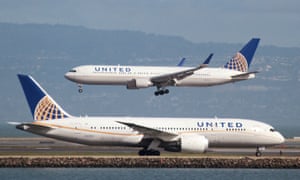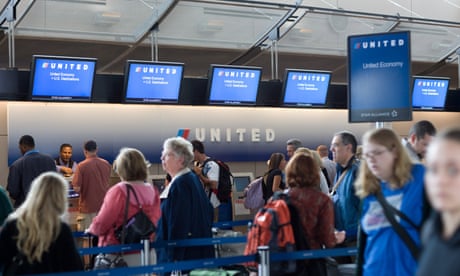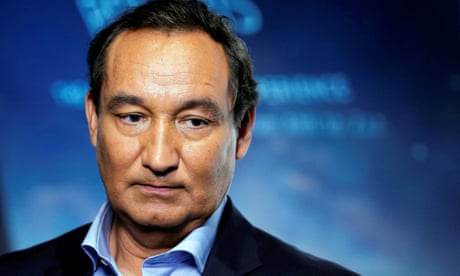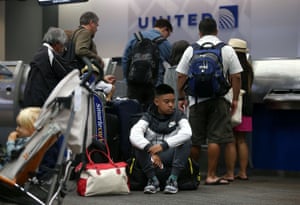Dan Milmo in The Guardian

United Airlines planes at San Francisco international airport. Photograph: Louis Nastro/Reuters
Airline passengers beware: when you buy a ticket, you are not only subjecting yourself to the ordeals of security queues, baggage limits and turbulence. You are also signing a near-40,000-word contract with a carrier that, in the extreme case of a United Airlines passenger on 9 April, could have you hauled off an overbooked aircraft – legally – as fellow customers and a global web audience look on aghast.

United Airlines shares plummet after passenger dragged from plane
Sunday’s extraordinary scenes on a Chicago, Illinois, to Louisville, Kentucky, flight unfolded because of two regulations that are standard practice across the industry. The first says a passenger can be barred from a flight if the number of customers with tickets exceeds the number of seats. The second says the captain can have you removed from the plane if you get emotional about it.
Air travel is a thicket of regulations and acronyms that, of course, have your safety at heart. But there can be a thin line between guaranteeing your security and dragging a seemingly innocent passenger off an overbooked aircraft.
Flight overbooking is a phenomenon born of an industry that has struggled historically to make money. Indeed, airlines lost nearly $50bn (£40bn) in the past decade due to a combination of the 9/11 attacks, high oil prices and the credit crunch. The sector is making money now, but profits are slender – $9.89 per passenger per journey – so taking a risk and selling 183 tickets for a 180-seater plane is worth it if three of those passengers fail to turn up and you can pocket their fare expenditure as pure profit.
“Airlines have very large fixed costs, so if they don’t fill the plane past a certain point they will lose money. They know a certain proportion of these passengers will not show, so they need to overbook to get to break-even or better,” says Brian Pearce, the chief economist of the industry’s trade body, the International Air Transport Association.
The contract of carriage at United – the conditions to which you agree when you buy a ticket – comes in at 37,000 words and embraces a range of arcane treaties and rules, from the Montreal and Warsaw conventions to FARs, the US’s federal aviation regulations.
According to one legal expert, United was acting within its rights as the furore unfolded when it tried to find seats for four crew who needed to reach a plane they were due to operate in Louisville. But such a calamitous collision of passenger rights and airline prerogative is unlikely. “It is a very rare set of circumstances,” says Kevin Clarke, a flight-delay specialist at UK law firm Bott & Co. Pointing out that US airlines usually seek, and find, volunteers to come off full flights in exchange for compensation, he adds: “It can be a question of who backs down first.” In the case of this United flight, the passenger certainly didn’t.
United’s contract of carriage is a joyless tour of one of the world’s most over-regulated industries, where a minority of colourful terms – “acts of God”; “civil commotions” – is crowded out by tightly worded legalese that will stop you from taking any future journey for granted (at least on United). Under rule five, covering “cancellations of reservations”, the passenger is warned that all flights are “subject to overbooking”, which could result in the airline being unable to put the passenger on the flight. In that scenario – please bear with this – rule 25, on passengers denied boarding compensation, kicks in.

United Airlines CEO calls dragged passenger 'disruptive and belligerent'
Using language that inadvertently acknowledges the confrontation inherent in the situation, it states that, if no passengers agree voluntarily to give up their seats in exchange for compensation, “other passengers may be denied boarding involuntarily”. Admittedly, there is recompense of about $1,000 available in this scenario, but it appears that the United passenger in this case said no. This brought him head to head with the far tougher rule, enshrined under the 1963 Tokyo Convention, that says the captain’s word is law on an airliner and that he or she has “the ultimate authority” in dealing with any onboard incident.
Rule 21 of United’s contract states that removal of a passenger may be necessary if their conduct is deemed to be “disorderly, offensive, abusive or violent”. It appears that the Louisville-bound passenger refused to give up his seat voluntarily and the crew deemed his behaviour to be out of line, prompting them to call in the security team at Chicago O’Hare international airport.

Compensation for delays caused by overbooking is guaranteed by EU law. Photograph: Justin Sullivan/Getty Images
Speaking to the Guardian on the condition of anonymity, a senior pilot at a major airline said: “The legal position is that you are not guaranteed to travel and that you must obey any ‘reasonable commands’ of the crew. So, legally, the airline is right.
“If it were me, I might have sought to promote a different solution [to allow] the crew to travel. I suspect a crew was ‘out of hours’ [about to exceed its working-hours limit] or sick or injured somewhere else on the network and the decision was therefore a little late to send them on that aircraft. I think the reputational damage from the events on Facebook will be significantly worse than a delay – even significant – elsewhere.”
Airline professionals are astonished that United’s overbooking procedures, in a market where overbooking is prevalent, resulted in a passenger being allowed to board before they were subsequently dragged off. John Strickland, an industry consultant whose career has included managing the overbooking process at a major airline, says carriers now have sophisticated computer systems that calibrate whether flights can get away with being overbooked – right down to the specific route, the time of day and whether demand will surge due to holidays or special events. However, he adds: “It is not a perfect science, which means when it goes wrong it needs to be handled sensitively.” This is where United, a so-called full-service airline that tries to offer a level of customer service superior to that of budget rivals, could suffer lasting reputational damage.
At the end of rule 25, United states: “UA shall not be liable for any punitive, consequential or special damages arising out of or in connection with UA’s failure to provide the passenger with confirmed reserved space.” Best of luck with that one, United.
An argument in favour of airline laws is what happens when they disappear. In the UK, compensation for delays caused by overbooking is covered by a regulation called EU 261/2004. According to industry lore, it came into fruition when MEPs grew exasperated with being bumped from flights to Brussels and Strasbourg. But airline passenger compensation could be one of the items of red tape that will be lobbed into the Brexit bonfire come EU independence day. One of the unintended consequences of severing links with Brussels, and abandoning EU 261/2004, is that passengers flying from the UK could be exposed when we say goodbye to the single market.
“There is the possibility that we adopt the principles of the regulation [after leaving the EU],” says Bott and Co’s Clarke. “But it is a possibility that we will be left without that protection. The obligation to put you on an alternative flight, the entitlement to compensation, that would not be there. You could be left stranded.”
Another reason for Michael Gove and his fellow Brexiters to stick to the staycation.
Nick Duffell in The Guardian
In Britain, the link between private boarding education and leadership is gold-plated. If their parents can afford it, children are sent away from home to walk a well-trodden path that leads straight from boarding school through Oxbridge to high office in institutions such as the judiciary, the army, the City and, especially, government. Our prime minister was only seven when he was sent away to board at Heatherdown preparatory school in Berkshire. Like so many of the men who hold leadership roles in Britain, he learned to adapt his young character to survive both the loss of his family and the demands of boarding school culture. The psychological impact of these formative experiences on Cameron and other boys who grow up to occupy positions of great power and responsibility cannot be overstated. It leaves them ill-prepared for relationships in the adult world and the nation with a cadre of leaders who perpetuate a culture of elitism, bullying and misogyny affecting the whole of society.
Nevertheless, this golden path is as sure today as it was 100 years ago, when men from such backgrounds led us into a disastrous war; it is familiar, sometimes mocked, but taken for granted. But it is less well known that costly, elite boarding consistently turns out people who appear much more competent than they actually are. They are particularly deficient in non-rational skills, such as those needed to sustain relationships, and are not, in fact, well-equipped to be leaders in today's world.
I have been doing psychotherapy with ex-boarders for 25 years and I am a former boarding-school teacher and boarder. My pioneering study of privileged abandonment always sparks controversy: so embedded in British life is boarding that many struggle to see beyond the elitism and understand its impact. The prevalence of institutionalised abuse is finally emerging to public scrutiny, but the effects of normalised parental neglect are more widespread and much less obvious. Am I saying, then, that David Cameron, and the majority of our ruling elite, were damaged by boarding?
It's complex. My studies show that children survive boarding by cutting off their feelings and constructing a defensively organised self that severely limits their later lives. Cameron, Boris Johnson, Jeremy Hunt, Andrew Mitchell, Oliver Letwin et al tick all the boxes for being boarding-school survivors. For socially privileged children are forced into a deal not of their choosing, where a normal family-based childhood is traded for the hothousing of entitlement. Prematurely separated from home and family, from love and touch, they must speedily reinvent themselves as self-reliant pseudo-adults.
Paradoxically, they then struggle to properly mature, since the child who was not allowed to grow up organically gets stranded, as it were, inside them. In consequence, an abandoned child complex within such adults ends up running the show. This is why many British politicians appear so boyish. They are also reluctant to open their ranks to women, who are strangers to them and unconsciously held responsible for their abandonment by their mothers. With about two-thirds of the current cabinet from such a background, the political implications of this syndrome are huge – because it's the children inside the men running the country who are effectively in charge.
Boarding children invariably construct a survival personality that endures long after school and operates strategically. On rigid timetables, in rule-bound institutions, they must be ever alert to staying out of trouble. Crucially, they must not look unhappy, childish or foolish – in any way vulnerable – or they will be bullied by their peers. So they dissociate from all these qualities, project them out on to others, and develop duplicitous personalities that are on the run, which is why ex-boarders make the best spies.
Now attached to this internal structure instead of a parent, the boarding child survives, but takes into adulthood a permanent unconscious anxiety and will rarely develop what Daniel Goleman calls emotional intelligence. In adulthood he sticks to the same tactics: whenever he senses a threat of being made to look foolish, he will strike. We see this in Cameron's over-reaction to Angela Eagle MP, less than a year into his new job. "Calm down, dear!" the PM patronisingly insisted, as if she were the one upset and not he. The opposite benches loved it, of course, howling "Flashman!" (the public school bully from Tom Brown's Schooldays), but they never take on the cause of these leadership defects.
Bullying is inevitable and endemic in 24/7 institutions full of abandoned and frightened kids. Ex-boarders' partners often report that it ends up ruining home life, many years later. Bullying pervades British society, especially in politics and the media, but, like boarding, we normalise it. When, in 2011, Jeremy Clarkson ranted that he would have striking public-sector workers shot, he was even defended by Cameron – it was apparently a bit of fun. No prizes for guessing where both men learned their styles. And no wonder that the House of Commons, with its adversarial architecture of Victorian Gothic – just like a public school chapel – runs on polarised debate and bullying.
Strategic survival has many styles: bullying is one; others include keeping your head down, becoming a charming bumbler, or keeping an incongruently unruffled smile in place, like health secretary Jeremy Hunt, former head boy at Charterhouse. In a remarkable 1994 BBC documentary called The Making of Them, whose title I borrowed for my first book, young boarders were discreetly filmed over their first few weeks at prep school. Viewers can witness the "strategic survival personality" in the process of being built. "Boarding school," says nine-year-old Freddy, puffing himself up, putting on his Very Serious Face and staring at the camera, "has changed me, and the one thing I can do now is get used [to it]". This false independence, this display of pseudo-adult seriousness is as evident in the theatrical concern of Cameron as it was in Tony Blair. It displays the strategic duplicity learned in childhood; it is hard to get rid of, and, disastrously, deceives even its creator.
The social privilege of boarding is psychologically double-edged: it both creates shame that prevents sufferers from acknowledging their problems, as well as unconscious entitlement that explains why ex-boarder leaders are brittle and defensive while still projecting confidence. Boris is so supremely confident that he needs neither surname nor adult haircut; he trusts his buffoonery to distract the public from what Conrad Black called "a sly fox disguised as a teddy bear". On the steps of St Paul's, Boris commanded the Occupy movement: "In the name of God and Mammon, go!" Was it a lark – Boris doing Monty Python? Or a coded message, announcing someone who, for 10 years, heard the King James Bible read in chapel at Eton? Those who don't recognise this language, it suggests, have no right to be here, so they should just clear off.
This anachronistic entitlement cannot easily be renounced: it compensates for years without love, touch or family, for a personality under stress, for the lack of emotional, relational and sexual maturation. In my new book, Wounded Leaders, I trace the history of British elitism and the negative attitude towards children to colonial times and what I call the "rational man project", whose Victorian boarding schools were industrial power stations churning out stoic, superior leaders for the empire.
Recent evidence from neuroscience experts shows what a poor training for leaderships this actually is. In short, you cannot make good decisions without emotional information (Professor Antonio Damasio); nor grow a flexible brain without good attachments (Dr Sue Gerhardt); nor interpret facial signals if your heart has had to close down (Professor Stephen Porges); nor see the big picture if your brain has been fed on a strict diet of rationality (Dr Iain McGilchrist). These factors underpin Will Hutton's view that "the political judgments of the Tory party have, over the centuries, been almost continuously wrong".
With survival but not empathy on his school curriculum from age seven, Cameron is unlikely to make good decisions based on making relationships in Europe, as John Major could. He can talk of leading Europe, but not of belonging to it. Ex-boarder leaders cannot conceive of communal solutions, because they haven't had enough belonging at home to understand what it means. Instead, they are limited to esprit de corps with their own kind. In order to boost his standing with the rightwingers in his party, Cameron still thinks he can bully for concessions, make more supposedly "robust" vetos.
His European counterparts don't operate like this. Angela Merkel has held multiple fragile coalitions together through difficult times by means of her skill in relationships and collaboration. Though deadlocked at home, Barack Obama impressed both sides of British politics and in 2009 entered the hostile atmosphere of the Kremlin to befriend the then-president Dmitry Medvedev and make headway on a difficult disarmament treaty. In a subsequent meeting with the real power behind the throne, Obama invited Vladimir Putin to expound for an hour on what hadn't worked in recent Russian-American relationships, before responding. Despite their elitist education, and because of it, our own "wounded leaders" can't manage such statesmanship.
To change our politics, we'll have to change our education system. Today, most senior clinicians recognise boarding syndrome, several of whom recently signed a letter to the Observer calling for the end of early boarding. Its elitism ought to motivate the left. The Attlee government intended to disband the public schools, but not even Wilson's dared to. There's a cash problem: boarding is worth billions and has a massive lobby. Unlike most other European countries, our state does not contribute a per capita sum towards private education, so dismantling these schools, which still enjoy charitable status, would be costly. But can we really afford to sacrifice any more children for the sake of second-rate leadership?



